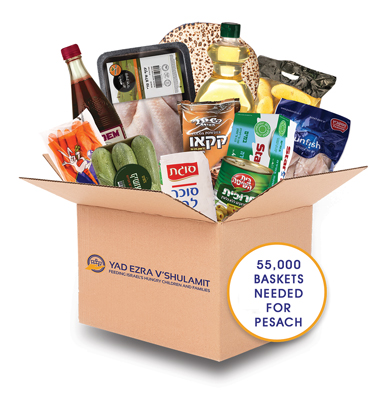ROCHEL GROSZ
IN THE WEE HOURS OF THE MORNING, THE TRUCKS START ROLLING IN. ONE TRUCK IS FROM SDEROT, ANOTHER FROM THE NORTH AND SEVERAL FROM COMPANIES IN JERUSALEM. THE WAREHOUSE BEGINS TO FILL UP WITH TONS OF PRODUCE, LITERALLY TONS. BASIC FOOD PRODUCTS PILED HIGH READY TO BE SORTED, SO BY WEDNESDAY THE SYMPHONY BEGINS.

It is a symphony of logistics, where hundreds of volunteers seamlessly gather, pack and distribute food for over 300,000 people. What could easily be a nightmare is genius organization in action.
How is this possible?
“I’ve been volunteering for Yad Ezra V’Shulamit for over 10 years now. I feel great helping people get the basic food they need. It’s the highlight of my week,” stated Avi Shalom.
Avi is one of hundreds of volunteers that come out every week to make a difference in the lives of the over 2,000,000 poor people in Israel. “We couldn’t get food to people for Pesach without our volunteers,” said CEO Eli Kafif.
He continued, “The army sends troops to pack, people volunteer to deliver food packages to those who can’t pick them up, seminary students, tourists and everyday people all go the extra nine yards and make this work.”
The organization usually delivers 12,000 food baskets weekly so the infrastructure is a well-oiled system. Still, getting all the baskets and vouchers into the right hands is a logistical feat. Scheduling deliveries and pickups and keeping track of recipients requires a cadre of helpers and equipment. All must work in perfectly-coordinated tandem to get food to needy people on time for the Passover Seder.
Today, with more than one-third of all Israeli children living under the poverty line, Yad Ezra V’Shulamit has their hands full. In fact, thousands of people are on a waiting list for additional food baskets.
The world views Israel as an affluent nation, but according to the Organization for Economic Co-operation and Development (OECD), Israel is 36th out of 37 countries with the most hungry children, only ahead of Costa Rica. With high taxes due to high security needs, even middle-class families are barely making it—especially with the price hikes over the past year.
“We don’t make ends meet in a normal month. How on earth can we make Pesach, which requires so much more,” one recipient exclaimed, “Yad Ezra V’Shulamit gives us a basket every week, but the Pesach basket really saves the holiday.”
With prices skyrocketing, and the number of poor growing daily, it seems the judicial crisis and politics should pale in comparison to our children going hungry. And yet, those other news stories overshadow the real problems facing Israel’s poor.
“I want to be part of the solution. I remember when I didn’t have enough to eat and now that I’m better off, I want to help those who aren’t making it. I know what it is like. I feel like this is my way of paying back what people did for me,” said Joseph Sultan, a volunteer for decades.
POVERTY IS REAL IN ISRAEL
So what does poverty mean in real terms to poor families? It means children go to bed hungry. Kids go to school without lunch. They can’t learn properly. Many act out inappropriately because of their hunger.
Families under the poverty line are eating pasta and white bread as their meals. Sisters go to school on alternate days because they share a coat. Children wear sandals all year, or shoes that are torn, or too tight, because they can’t afford new ones.
Yael, a widow who cleans houses to support her children and is a recipient of a food basket, said, “If not for the weekly food box we receive from Yad Ezra V’Shulamit, I would not have anything to put on the table.”
This hurts all of us. Is this our responsibility? Yes. We need to step up to the plate and help get food to the poor in Israel—especially the children.
WHAT CAN WE DO?
Yad Ezra V’Shulamit, distributes more food baskets than any other organization in Israel. Take a look at their website and see where you can help. The government needs to do much more, but we also need to do more.
This is a call to every person who cares about Israel, and her future. Are these not our children? Do something to feed Israel’s hungry children—especially for Pesach.To help visit www.yadezra.net/food.
Rochel Grosz is a Los Angeles native who made Aliyah in 2021. She profiles non-profits who make a difference.